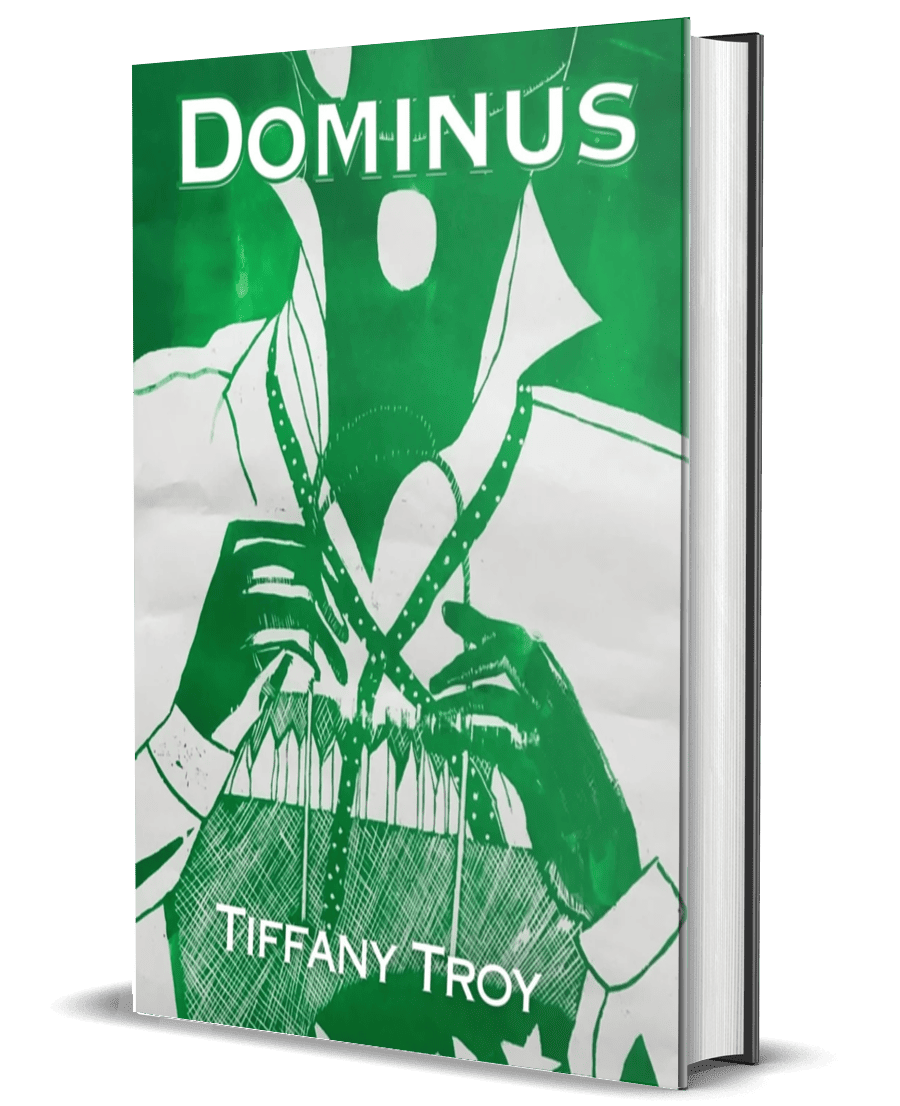
Dominus
Dominus by Tiffany Troy is a powerful and emotionally intense debut that explores identity, power, labor, and resistance within oppressive social and cultural systems. Blending myth, philosophy, and contemporary life, the collection follows a voice struggling for meaning, dignity, and transformation in a fractured world shaped by authority, bureaucracy, and inequality. Through lyrical intensity, dark humor, and fierce imagination, the work confronts suffering while ultimately searching for transcendence, justice, and the enduring possibility of hope.
About The Book
If logos, the law of the father, could be personified, the “Master” of Tiffany Troy’s devastating debut collection Dominus is its Hegelian sine qua non. It follows the journey of a “Baby Tiger” whose lyric powers and canonical, mythic transmutations (of Dostoevsky, Whitman, Machiavelli, Montaigne, and the epic Greeks) evince the apprenticeship of a genius. Is it wrong to “want life to matter” amid a wasteland of toxic positivity, double whoppers, trains, and “fathers beyond reproof”? If work involves subjection, rage, and shame, is poetry—the “Lyrical I” of a “shredded soul”—a higher legislature capable of revolt? Darkly funny, virtuosic, and formally ingenious, Dominus offers a cathartic transcendence from paternalist and systemic oppressions, via a symbiotic power dynamic whose pathos rivals Cordelia and Lear. What Troy forges in this trial by fire isn’t “corporate professional” compliance but a soul: the Nietzschean transformations of her speaker move through “the light Blake calls experience” to arrive at sublimity: “the golden center of the heart.”
—VIRGINIA KONCHAN, AUTHOR OF BEL CANTO
To walk through the world of Tiffany Troy’s astonishing debut collection, Dominus, is to honor the scalding “month that leaves like a lamb” and to acknowledge the “shimmering lunacy” of our world divided by labor, “Google Calendar,” “QuickBooks season,” human brutality, and “how evil always justifies itself through mundaneness / and bureaucracy.” Dominus is origin story: “In the beginning, all we could do was eat, shit, and money. / Deposit and spend money in takeout places where we died.” The speaker is often Cassandra swirling within and against her tragic consequence of speaking the truth-utterance in the face of any cost: the Doctor’s threat of exile, or “She can no longer look herself in the mirror,” or “Knife in hand… ‘To Hell with God.’” The most profound truth Troy impresses is a blueprint to interrogate the inferno of our everyday lives, lyre in hand, each “horrid spring” without compromising the music which survives us, as to never “kill the love in [our] hearts,” and face with dignity the Master and “myopic god who’s fuming.”
—CARLIE HOFFMAN, AUTHOR OF WHEN THERE WAS LIGHT
Fusing post-confessional bildungsroman with an allegory of late-capitalist corruption, Dominus astounds me with its heat and light, from its earliest “hope for all workers / to receive what they deserve” to its ultimate dread that “You either cooperate / or starve.” Powered by the combustion that unfolds when a valiant creative spirit confronts the “hellish landscape” of one rigged system after another, Troy transforms her speaker’s manifold subjugation into a spectacle of lyric clap back and alchemical escape act—a performance in which even defeat, always at least partly inevitable, is rendered with such tenderness, wit, and truthfulness to human life, it takes on positive value: “Between being afraid and falling asleep, / I curl into a little ball on the wooden floor.” Championing our tired and our poor, the immigrant workers and the “huddled masses yearning to get to work on time,” the outsiders consigned to “a panorama of never belonging” and “every girl who ever thought / maybe she had wronged the world by existing,” Dominus is as insistent on justice as it is baffled by its own hope, and its indomitable, distinctive voice has a power unlike that of any debut collection I’ve ever read, or of any book in recent memory.
—TIMOTHY DONNELLY, AUTHOR OF CHARIOT
Tiffany Troy’s debut poetry book, Dominus, moves continuously up and down Kenneth Koch’s “poetry thermometer,” descending from the lofty realm of Greco-Roman myth—where we encounter Aeneas, Odysseus, Dido, and others—to the YouTube animated BabyTiger children’s TV series. While Ilium burns, our heroine, a “Baby-Tiger” look alike who is also an attorney, makes her way across the city, fighting adversaries in court and gaining the necessary experience to not only endure but triumph in the troublesome world. The poems are filled with icons of pure goodness that act as talismans, among them Maria Goretti, one of the youngest canonized saints in the Catholic Church, stabbed to death at the age of eleven during an attempted rape by a neighbor. She forgave her attacker before her death and he, in time, became a Capuchin Franciscan brother. Behind the writing is the firm Blakean belief, expressed in his “Proverbs of Hell,” that “the road of excess leads to the palace of wisdom.”[Read more…]
AN INTERVIEW BY JOHN REED IN UIRTUS, A FULBRIGHT COMMISSION PUBLICATION BY UNIVERSITE DE LOME (ENGLISH) (FRENCH)
Tiffany Troy brings a monumental mythology to a beautifully succinct and profound twenty-first Century Ashdown forest. There is a quotidian heroism to the life of her characters, Master, Mama, Papa, and Baby Tiger, and the bringing to voice of the ongoing struggle to be oneself, as the world is, as time brings one catastrophe after another (the lost door key, the hour badly spent). Troy’s charisma and intelligence are only bolstered by her voluminous knowledge of poetry, and in Dominus, her debut collection (recently released by BlazeVox), she demonstrates all the command and casual laughter of a master poet.
Tiffany Troy’s Dominus makes its verbal headway at the vanguard of stream-of-consciousness, its poems accumulating into portraiture, throwing their legs over the boundary of the already-spoken out of dire necessity to make meaning with what we’ve fucking got. The scenery and characters change as the speaker-being-painted-in-words navigates work, family, expectations, deadlines, daily drudgery, daily euphoria, as well as all the trappings of popular American culture. “I specialize in disappointing people I love” opens the poems “This,” which closes with “as I lay like a ragged doll / on white linen I hate for being washable / and hence salvageable,” the oil and water of the self failing to mix, Troy’s brutal honesty morphing for the reader into a mirror.[Read more…]
To open Dominus, Tiffany Troy’s full-length poetry debut, is to enter a world that is both recognizably earthly and potently mythic. Here, the epic, eternal essences hidden within the most prosaic acts (consuming ketchup), scenes (arguing in a courthouse), and relationships (familial or otherwise) are revealed through Troy’s alchemical mix of voice and form. The book’s speaker is an honest, sharp, and subjugated “I.” Sometimes she is “Baby Tiger” and sometimes a “tamed wolf without fangs” beaten down by the cruelties of capitalism, corporate America, and paternal masters both human and divine. An overworked attorney, she’s the daughter of an immigrant father and a faraway mother who, despite feeling at times like “every girl who ever thought / maybe she had wronged the world by existing,” retains a capacity for incisive observation, keen feeling, and adaptive mutability fueled in part by “life-affirming brekkie” and steaming cups of Earl Grey. Troy’s poems never hover delicately above despair; indeed, there is a deep and wondrous aesthetic refreshment in their refusal to do so. And it is precisely “through the thick residue of the window pane” that her lines reveal light, and become it. Baby Tiger is akin to one of autumn’s “frowning sunflowers burdened / by the weight of their golden mane” who “cannot help / but peek up and beam.” [Read more…]
With mastery and artistic astuteness, Troy balances the tightropes of fictionalization and experiential reality, refusing to languish in sensationalist exposures, or feed the Twinkie-voracious reader. Instead, she plays along, positioning us straight away into a world that lies mid-way between socio-political reality and the vaster territories of fable, myth, and fairytale.
Tiffany Troy’s debut full-length poetry collection, Dominus, centers around finding openings in spaces of enclosure.
Restraint takes on many manifestations in the collection, some of them material (“I am chained to the bottom of the sea”) and others ideal (“a Twin, a Wink, / a Key to our repressed psyche”) in an attempt to understand it from many perspectives, as if it were a site to be navigated through. The theme is so rigorously inspected that by the end of the collection the reader comes no closer to understanding who is responsible for restraining the poet: instead of assigning fault, Troy withholds it. [Read more…]
Expanding upon her chapbook, When Ilium Burns, Tiffany Troy develops the themes of justice and oppression, hope and futility, in her new full-length collection, Dominus. The title, a Greek word meaning “master” (or “owner” – of slaves), harks back to the oppressive character of “Master” who cruelly dominates the narrator of the chapbook. He’s back! Not all of the poems from When Ilium Burns (a clever self-reference as “Ilium” is another name for “Troy,” who burns with outrage as well as compassion), are included in Dominus, but the plight of the immigrant experience in America is at the heart of the collection. [Read more…]
If you are true to the calling of poetry, there are some inescapable steps: you take a deep breath, jump in its unpredictable ocean, vow to read the great poets of the past, and embrace the young poets who intend to carry the message forward. Reading Tiffany Troy’s Dominus, I knew I encountered someone whose work is serious, willing to share intimate truths but not enamored with self-significance, weaving a tapestry where others can find their lives as well.
Tiffany is a poet forged in two traditions: the legacies in the island of Formosa inherited from a stern father and Flushing, Queens, that bestowed, among many Western deities and ghosts, McDonald’s upon her palate. Her poems reflect how power washed ashore in our lives, her passion for the teachings of Greek mythology, and how being curious about being a human being, came to affirm her freedom as a particular self. [Read more…]
ZORA SATCHELL, BROOKLYN POETS
In “Dominus,” Tiffany Troy’s debut, our narrative speaker “Baby Tiger” negotiates her own relationship to power and views herself as a contained power system within spaces of corporate corruption and late-stage capitalism. She depicts her relationship with the figure “the master,” against whom she struggles. This cruel master is determined to instill in her a ruthless self-hatred, intending to shape Baby Tiger into a worthy adversary driven purely by the logos of the law and a capitalistic ethos where “without money, there is no dignity.” However, Baby Tiger does not merely present herself as a passive villager vying for comfort over survival. Unlike her description in “When Ilium Burns,” where she is unable to move in the face of imminent destruction, throughout this collection she describes the grueling breakdown of trying to build oneself up to resist, only to be crushed once more under the “evil (that) always justifies itself through mundaness and bureaucracy” and wonders what’s so wrong with “wanting life to matter” in the face of brutal labor divisions. Dominus is a devastating debut that invites the reader along an illustrious journey synthesizing ancient Greek epics, Dostoeksy, and isekai misadventure, that highlights the baffling longing for and resilience of hope.

